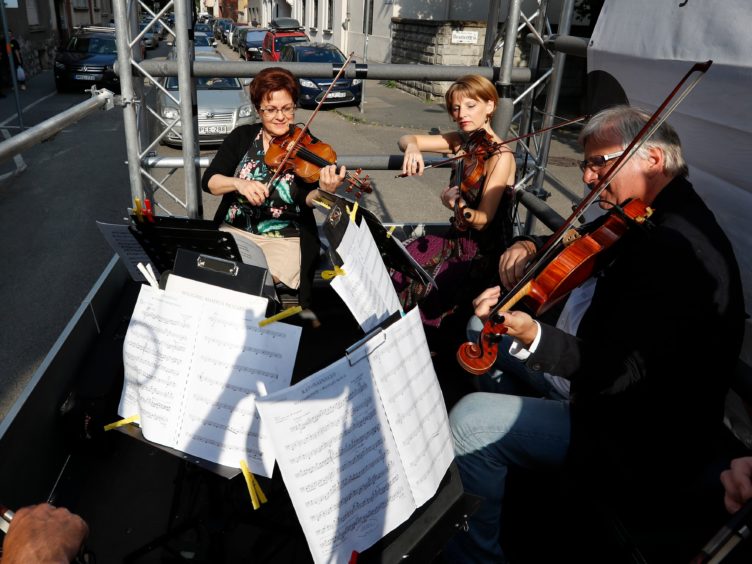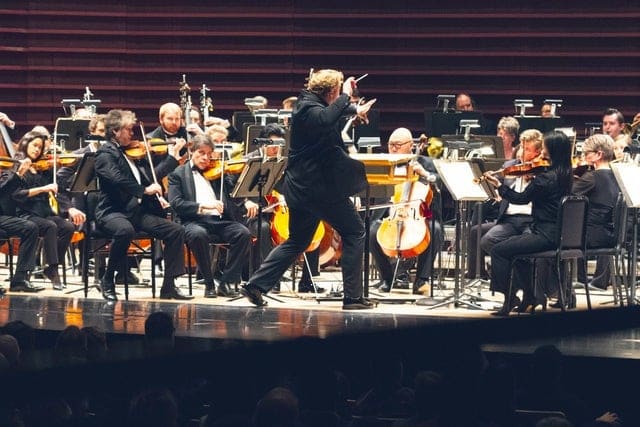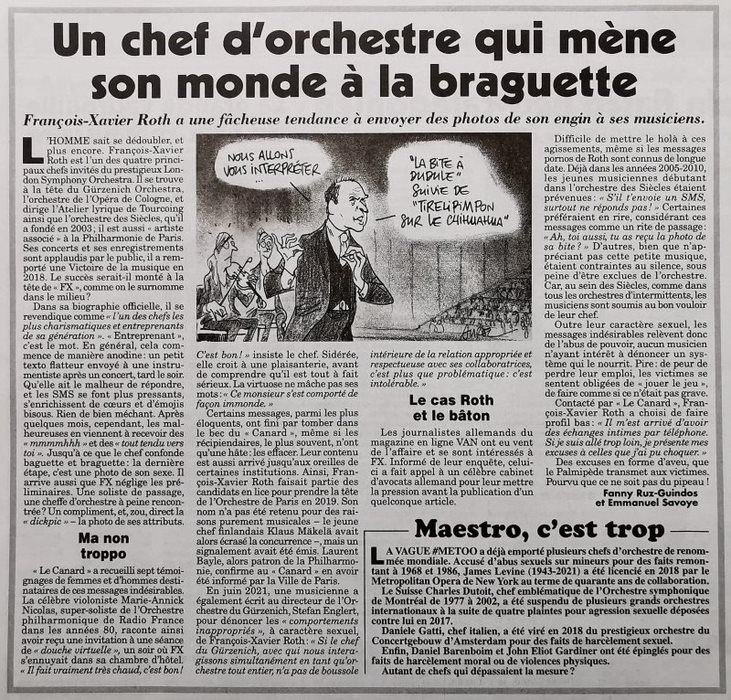How Brexit is punishing orchestras
OrchestrasFrom a well-researched article by John Arlidge in the Sunday Times:
… Orchestras are suffering too. They face two problems unique to their scale and operation. With up to 120 players in a symphony orchestra, wrangling work permits “can be a nightmare”, says Hanna Madalska-Gayer, the head of policy and communications at the Association of British Orchestras. “Orchestras are having to hire up to two extra staff to navigate all the new rules and bureaucracy, which now is the equivalent of organising a tour to Asia — all for a place on our doorstep.”
What’s more, unlike amplifiers and electric guitars, classical instruments, which can be worth up to £10 million per orchestra, have to be transported in air-conditioned, humidity-controlled lorries with a unique packing case for each instrument. British orchestras use British trucks, often bought with taxpayers’ money at up to £250,000 each, but can no longer use them for EU tours due to the post-Brexit three-stops-and-you’re-out rules. Renting similar lorries in the EU is hard because the UK provides most of them. It’s also expensive, “adding around £30,000 to the cost of a tour, which makes the difference between it being profitable or loss-making”, Madalska-Gayer says.
Read on here.






Brexit was one of the worst examples of national self-destruction in world history. The sooner it is reversed, the better.
Do you seriously think the EU want the UK back?
Only Northern Ireland has a chance.
Good to see this incredibly important issue for all the UK performing arts being clearly explained and put into print (again).
Everyone who has anything to do with touring into the EU any UK symphony or chamber orchestra, ensemble, choir, pop group (mega or unknown), jazz combo, theatre group (let alone individual soloists who can use up their 90/180 days allowance on just one opera, so be unable to work in the EU for the remaining 90 days), whether major international names bringing tens of millions back into the UK, or the smallest combo gigging out of the back of a van (but maybe later becoming the next mega-stars), has been on about this ever since what was for UK arts a hugely disadvantageous agreement was being negotiated with the EU.
All of us, individually and through the national representative organisations (UK Music, MU, ABO, IAMA, ISM and more besides) tried so hard to point out to the UK’s negotiators that what they were suggesting would make a monumental hole in the UK’s arts sector, as touring into the EU was a significant part of the UK’s highly profitable music industry.
With a turnover by UK music of more than £5 billion annually (five times that of the fishing industry, and employing vastly more people, yet months were spent negotiating UK fishing rights with the EU), and the wider creative arts being worth £110 billion annually, this was no small sector.
It was largely political because for UK arts groups to be allowed tour the EU, the UK would have had to give reciprocal agreements for EU groups to tour here (not that the UK has nearly so much money on offer to pay them, so it was still going to be a huge net gain to the UK economy). The EU was ready to do this. But this would have gone against the “take back control” mantra of the UK politicians who were running the show. Even the hard-nosed Lord Frost later admitted that the negotiations he’d headed got it seriously wrong for UK arts. And even for those in (or out of) power who aren’t much bothered that tens of thousands of arty types have had their livelihoods seriously curtailed, from a purely economic point of view the UK economy has been substantially disadvantaged.
Remoaner nonsense as usual from this blog. Why should British orchestras be playing concerts for a European audience? That it now requires some extra admin is a small price to pay for our nation’s sovereignty!
Brexiteer bilge. The next step this government of tory crooks will be taking along the road of “our nation’s sovereignty” will be to strip us of our rights – basic human rights like clean water, food and accommodation – all in the interests of lining their pockets and hiding their criminally-gained profits in offshoire bank accounts.
Accommodation? Really?
And where is the pressure on that coming from?
Elephant in the room – or rather elephant in the commandeered hotel. But no chance whatsoever of that being discussed here.
Jingoist bullshit.
JB: I have yet to see any meaningful benefits from Brexit, so I am still a proud remainder. I see only a large number of disadvantages. The return of sovereignty, to UK politicians for whom I have little respect, is no compensation at all. As an orchestra member, I don’t see £30,000 per tour of extra expenses as a small price to pay. That’s money that could go into artistic work, or, from a self-interested perspective, into our salaries, the spending power of which has declined alarmingly.
What price have you personally paid in return for more sovereignty, or are you just happy that others are paying it?
Another well thought out result of BREXIT.
Glad to be an American and that we left you Brits in 1776.
Get a new joke book old man.
These are the kinds of problems Britain joined the EU to avoid. So, now that they are out, what do they expect?
The European Union offered exceptions for musicians, to make travel as easy as possible. The United Kingdom was not interested. Probably just another Brexit benefit in disguise. In very, very deep disguise.
The EU did not offer any relaxation of cabotage rules unfortunately.
But there were ideas and proposals to make traveling much easier than it is today. And, as I said, the UK was not interested. https://www.politico.eu/article/michel-barnier-brexit-touring-artists-work-permit-visa-free-travel/
Brexit has been a disaster for Britain. Make Farage finance AND drive the lorries.
Good find NL.
Behind a paywall.
Orchestras were one of the many collateral damage arising out of Brexit. Those who advocated for this “cultural/economic/ political ideal” neither thought of its impact on orchestras nor cared of its result on them. What British orchestras should do, is what many businesses have done in the UK – rather perversely but necessarily – is to invest in and create European subsidiary orchestras.
All those who promoted Brexit, often with major lies, and then failed to anticipate and sort out all the many problems like those mentioned in this thread should be made to pay from their personal fortunes for those lies and failures. It was a massive con trick.
Whinge, whinge, whinge… the cost of living crisis is causing far more problems for any of the arts and and people choosing how they spend their hard earned cash very carefully when it comes to going to a concert – or indeed tge cost of going on tour and all the subsistence costs too. Brexit happened some years ago, not last week. It was no surprise, and no surprise the EU putting obstacles in the way that they didn’t do with Norway or Switzerland not EU. Yes, teething problems, like Brexit or not. But they all had time to plan for Brexit. There was no time to plan for such a cost of living crisis and hardship.
The cost of living crisis is a direct consequence of brexit. Whilst inflation has already started to ease in EU countries, in the UK it remains stubbornly high. This is because there are more barriers to trade, more restrictions on immigration which has in effect reduced the available workforce and we were experiencing supply side issues well before the start of the war in Ukraine (gas shortages and empty supermarket shelves in the autumn 2021, ie), which has only exacerbated these problems. All this adds to inflationary pressures and now the BoE says that the only way out of this crisis is to create an artificial recession with the goal of stopping people from demanding higher wages; and firms from raising prices in expectation of higher costs. Finally, the Swiss and Norwegian models were on the table during the negotiations for the withdrawal agreement, but they were bluntly refused by the brexit hooligans as “not taking back enough control”, as the UK would have to reciprocate. Not to mention the damage ACE has inflicted on well respected British Arts institutions all in the name of “levelling up”
https://www.telegraph.co.uk/business/2023/06/22/bank-of-england-britain-recession/
The main cause of the cost of living crisis (which is just as bad in the EU as in the UK, and worse in many places) is the severe curtailment of our liberties in the UK (and elsewhere) that took place in 2020 and 2021. You cannot ban the majority of people from going to work, increase public debt, and initiate a massive transfer of wealth from the taxpayer to some of the world’s biggest and most powerful corporations without eliciting a serious economic crisis. To make matters worse, the lockdowns were utterly ruinous for public health: leaving aside the catastrophic impact on non-COVID health issues (damage to mental health, failure to diagnose cancers and other serious problems in a timely manner, stunted educational development, fewer opportunities to prevent/catch neglect and domestic abuse), lockdowns failed on their own terms in that they did not even stop the proliferation of COVID-19 (because quarantine and containment strategies were never going to work against a highly infectious respiratory virus)… in fact, by reducing so drastically the relative mobility of the healthy, lockdowns made the vulnerable *more* likely to catch the infection. A more coherent policy (both for public health and for economic considerations) would have been an initiative to enable the vulnerable to “shield” voluntarily, or what the Great Barrington Declaration terms “focused protection”.
At the ABO annual conference in 2021 the guest speaker Caroline Dinange (DCMS) admitted that Frost didn’t even invite her Ministry to submit evidence or be present in the negotiations that led to Johnson’s fabulous oven ready deal.
In private, Mark Pemberton went along with the DCMS nonsense that brexit damage to the music sector would be minimal, whilst publicly decrying brexit impact. The ABO bought into the government spin for too long; it’s too late to cry about it now. Shape shifting after the event is no substitute for hard campaigning when it counts; if the ABO considers itself a genuine advocate for the industry, it would do well to learn that lesson.
This is incredibly rude, and inaccurate. I consistently talked up the damage that Brexit would cause to orchestras, including a Newsnight feature, and was the first to alert DCMS to the catastrophe of the road haulage limits.
No concern as usual for the impact that the EU low wage economy had on working class people, a problem that is slowly being overcome.
Have any of these musicians ever given a thought to the difficulties experienced by painters, bricklayers etc? Of course not. Pure snobbery.
A neighbour inherited a four bedroom house and had it renovated by five Polish workers who enjoyed free accommodation in return for their services. Nothing against them personally, but how could a painter with a family and a mortgage possibly compete with that?
1) A neighbour inherited a four bedroom house” gives away your economic demography somewhat, so not quite the moral high ground you might have hoped for and
2) This is a blog about music; perhaps you should be complaining on “Slipped Brick”, the blog for unhappy (?) builders and joiners.
With respect, experience of trying to employ a decent bricklayer or painter (or indeed a general builder) is that not only are they really hard to come by, as they are all booked up for ages ahead, but they charge a daily rate far in excess of that earned your average freelance orchestral player (just read the MU’s rate card). If you know of any unemployed brickies, there are building sites and firms right across the UK crying out for them, and paying very good wages.
It’s a shame that you think that jobbing orchestral musicians are snobbish – if you could spend some more time backstage you might find that the similarities with working on a building site are quite pleasing (and that’s not just the percussion players…).
But look at the EU. It’s all going swimmingly, isn’t it?